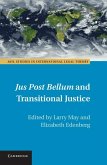Seminar paper from the year 2005 in the subject Law - Comparative Legal Systems, Comparative Law, grade: Merit 68 %, Coventry University (Coventry Business School), course: University Course: War, Law and Morality, language: English, abstract: Much water has swirled around the rocks of the "war on terrorism" in recent academic literature. Both political and strategic as well as legal analysts have delineated their views on how best the world community should tackle the phenomenon of terrorism. The clash of competing demands of civil liberties, international law and domestic security and whether or not violent responses to violence render both sides morally indistinguishable are only some of the difficult questions that the current debate is facing. It is often said, that the first casualty in "war" is the truth, and the second is law. While, in the present conflict, it might be an exaggeration to declare thatsilent leges inter arma,the law has certainly been used as an instrument by many in the debate, and its clarity has become increasingly obfuscated in the process.1The discussions about the anti-terrorism-laws in the British House of Commons in the first months of 2005 are, again, highlighting the fact that very different views can be held as to how the laws, the government and the society should retort to terrorist threats. Such discussions, quite clearly, do not only occur in the domestic sphere but also on the international echelon. The numerous recent Security Council Resolutions issued during the debate revolving around terrorism are a case in point. In this short paper we wish to firstly outline a few issues of a more general nature, drawing attention to some terminological particularities of the "war on terrorism" as well as some engaging moral aspects of the debate. Secondly, and being the main part of this paper, we will attempt to depict and analyse some of the aspects of both the "jus ad bellum" and the "jus in bello" in order to shed some light on the sometimes unclear legal situation regarding anti-terror measures. Methodologically, we will approach the core answer to the essay-question from two angles. One will consist of an investigation into selected prominent regulations and concepts of international law. The second will comprise the analysis of contemporary world experiences that might reflect a shift in the perception of international law on an international level. Certainly, we should keep in mind that we ought to avoid the temptation of muddying the water of clear analysis by deducing general insights from single cases.3However, in order to fully appreciate the impact of international law, the application to specific practical cases is indispensable.
Dieser Download kann aus rechtlichen Gründen nur mit Rechnungsadresse in A, B, BG, CY, CZ, D, DK, EW, E, FIN, F, GR, HR, H, IRL, I, LT, L, LR, M, NL, PL, P, R, S, SLO, SK ausgeliefert werden.









